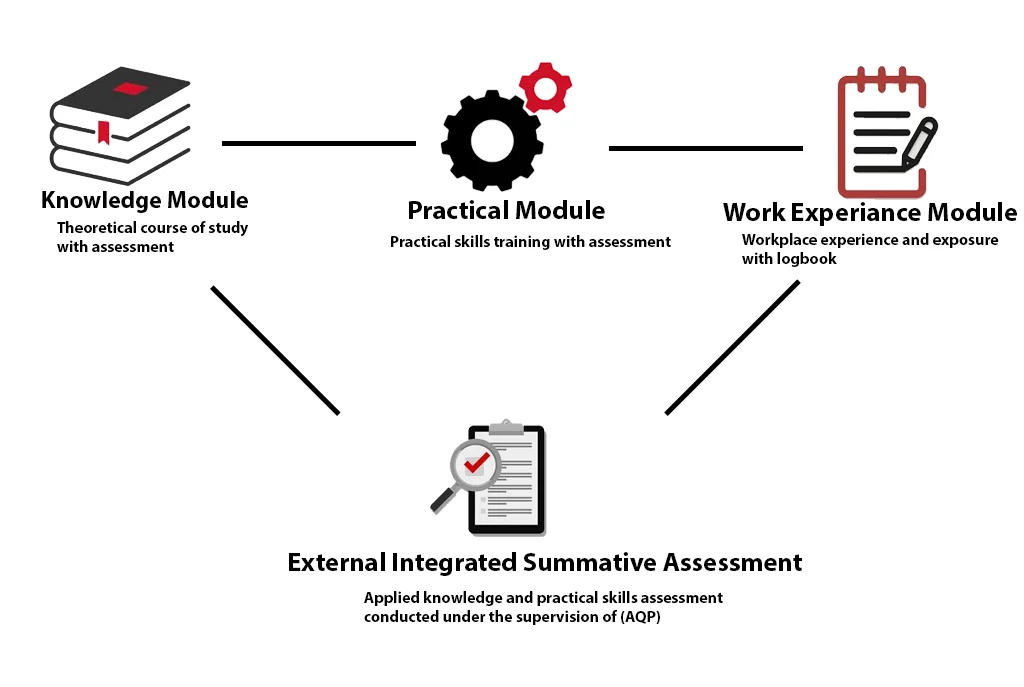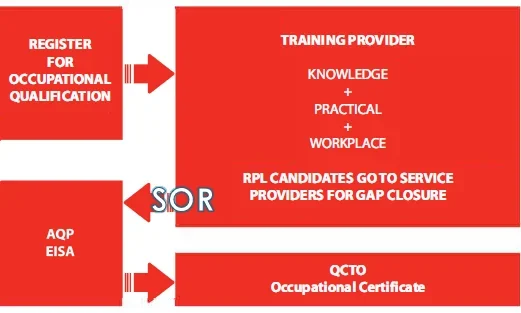About the QCTO
The Quality Council for Trades and Occupations (QCTO) has taken over the accreditation, implementation and certification of all occupational qualifications from the SETAs.
The change from SETA (Sector Education and Training Authority) to QCTO qualifications is part of the government’s efforts to streamline and improve the country’s education and training. It also ushers in a move to incorporate workplace experience into learning to
promote work readiness in all vocation.
The QCTO is responsible for quality assurance and the oversight of the design, accreditation, implementation, assessment and certification of occupational qualifications, part-qualifications and skills programmes. It also takes charge of the final summative exams that students will have to write in order to be awarded an occupational certificate.
QCTO Qualifications and Learnerships are comprised of three components and two sets of assessments:

SETA Qualifications and Learnerships are comprised of two components:
Assessments are conducted internally by accredited Training Service Providers following the completion of each learning programme throughout the duration the learnership (12months).
Duration: SETA learnerships are mostly 12 months long. The duration of QCTO qualifications depend on the number of credits for specific qualifications.
The External Integrated Summative Assessment (EISA) is an integral and critical component of the QCTO’s quality assurance system. It is a single national assessment leading to the awarding of an Occupational Certificate. EISA ensures that the assessment of occupational
qualifications, part qualifications and trades is standardised, consistent and credible.
For learners to qualify for entry to the EISA, they must provide proof of completion of all required knowledge, practical and work experience modules as stipulated in the qualification. The statement of results (SOR) obtained from the Skills Development Provider serves as proof
that the candidate has satisfied all the requirements to be admitted to sit for EISA.

An integral and critical component of the QCTO’s quality assurance system is the issuing of certificates to learners who have demonstrated competence against occupational qualifications and part qualifications registered on the National Qualifications Framework (NQF). The QCTO will work closely with Assessment Quality Partners (AQPs) who will recommend certification of learners to the QCTO.
Principles and processes through which the prior knowledge and/or skills of a person are made visible and are assessed for the purposes of certification, alternative access and admission and future learning and development.
Click here to go to the QCTO website.
About the SETA
SETA, which stands for Sector Education and Training Authority, is a South African body in charge of overseeing skills development and training within a particular industry sector.
Currently, there are 21 SETAs that focus on promoting skills development in their sectors.
Their primary function is to facilitate skills development through learning programmes like learnerships, skills programmes, internships and other learning programmes.
A Unit standard is a small learning unit which forms part of a qualification.
A short course usually consists of a single unit standard. They are designed to improve or refresh knowledge and skills in a particular field and for personal, social, or professional development. It should be noted that most short courses are non-credit bearing; however, internal credit accumulation can be done at Vital College once you have met the minimum credit requirement to be registered for a Skills Program.
A Skills Programme is a number of unit standards (or courses) which are occupationally based and when completed will constitute credits towards a qualification.
Credit-Bearing Courses
Credit-bearing courses are structured short learning programmes that contribute credits toward a unit standard and/or a full or partial qualification. These courses:
Non-Credit Bearing Courses
Non-credit bearing courses are short learning programmes that do not award credits toward unit standards or qualifications. These courses:
Click here to go to the SETA website.
Online Learning Platform
An electronic learning platform is an integrated set of interactive online services that provide trainers, learners, and others involved in education with information, tools, and resources to support and enhance education delivery and management.
We at Vital College utilize the Moodle eLearning platform.
Moodle is a Learning Management System (LMS) designed to help educators and trainers create, manage, deliver, and track online learning and training.
Launched in 2002, Moodle is one of the most widely used LMS platforms in the world. It enables flexible and efficient delivery of education and training to various audiences – whether in schools, universities, businesses, or training institutions.
Moodle is open-source, meaning it’s free to use and can be customized to suit the needs of different organizations.
Moodle is the online learning platform we use—alongside many other educational institutions—to deliver and manage our online learning programmes. Once you have enrolled and paid your fees, you will receive a username and password granting you access to the Moodle platform. Within this platform, your learning programme will be presented in a user-friendly, organized system that gives you access to:
The link to our Moodle platform is: [MOODLE]. Although you may not have access yet you can
still see what this portal looks like.
This is an instructional approach that combines digital or online learning materials and activities with traditional face-to-face classroom methods.
Classroom instruction time may be replaced or augmented by online learning experiences, and online learning can include varying degrees of interaction or just time alone in independent study and learning activities.
However, in a quality blended learning experience, the content and activities of both in-person and online learning are integrated with one another and work toward the same learning outcomes with the same content.
We’re here to help! Find answers to some of the most common questions about Vital College.
Fill in the form below and one of our student support team members will be in contact.